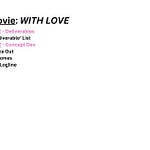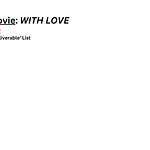Why Every Filmmaker Should Write Out Their Movie Idea First
Every filmmaker starts with a spark of inspiration—a story they feel compelled to tell.
But here’s the thing: ideas are fleeting.
Without writing them down, they risk being forgotten, diluted, or overshadowed by the next shiny thought.
Writing out your idea is the first, and arguably most important, step in making a movie.
It’s the foundation on which you’ll build your screenplay, attract collaborators, and eventually bring your vision to life.
In this post, I’ll explain why putting your idea into words is essential for filmmaking success.
I’ll also share insights from my own feature film, WITH LOVE, where this step set the tone for our entire journey.
Plus, as part of my transparent process, I’m sharing exclusive templates and resources to help you develop your own film ideas.
Why You Need to Write Out Your Idea
1. Gives Shape to Your Vision
An idea in your head is intangible—like a dream you can barely remember when you wake up.
Writing it down brings clarity and structure to your vision, allowing you to shape and mold it into something real.
Think of it as the first draft of your story.
It doesn’t need to be perfect, but it’s a starting point.
Once it’s on paper, you can refine it, add details, and identify what works and what doesn’t.
Example:
When I started WITH LOVE, all I had was a vague concept about a story of grief and healing. Writing it out forced me to focus on the key characters, the emotional arc, and the themes I wanted to explore.
It transformed my idea into a workable foundation.
2. Opens the Door to Collaboration
Filmmaking is a collaborative art, but you can’t expect others to share your vision if it’s stuck in your head.
Writing out your idea is the first step in communicating it to potential collaborators, whether they’re producers, writers, or crew members.
Example:
The first thing I sent to my co-producer for WITH LOVE was a short, written synopsis of the idea.
This simple document sparked a conversation that led to the full development of the film.
3. Helps Identify Strengths and Weaknesses
Writing out your idea forces you to confront its strengths and weaknesses.
Is the concept strong enough to sustain a feature-length film?
Are the characters compelling?
Writing gives you the space to evaluate your idea critically and make improvements before diving into full-scale development.
Example:
In the early stages of WITH LOVE, I realized the core conflict wasn’t clear enough.
Writing it out helped me identify the problem and brainstorm ways to raise the stakes for the characters.
🎬 Take the Next Step in Your Filmmaking Journey
Filmmaking is daunting—you know the vision in your head, but turning it into reality feels impossible without clear guidance and tools.
Imagine having a front-row seat to a movie being made and walking away with all the templates, resources, and inspiration you need to make your own.
The WITH LOVE All-Access Pass is your ticket to demystifying the filmmaking process, offering an unparalleled behind-the-scenes experience and every resource in one bundle.
This post includes a video walkthrough, template, and real production document to review for paid subscribers.
More paid content below…










